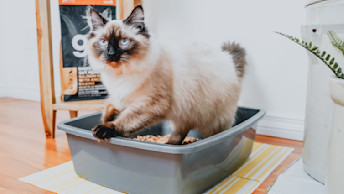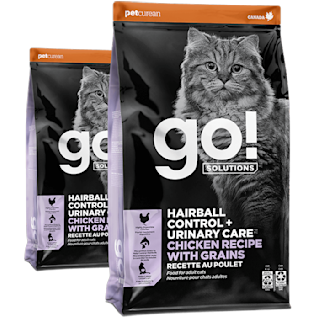March 28, 2025
How to Tell If Your Cat Is Constipated

Some evidence suggests that cats "self-domesticated" themselves approximately 10,000 years ago by controlling rodent populations, helping farmers and integrating themselves in our lives for protection. Our relationship with cats is as ancient as it is symbiotic. Unfortunately, cats can suffer from ailments similar to those seen in humans, including constipation which can lead to serious health issues if left untreated.
How to Tell If Your Cat is Constipated
There are several obvious signs of constipation, but some cats can live with chronic constipation without their human realizing it.
The more visible symptoms of constipation in cats can include:
- Lethargy
- Vomiting
- Straining while inside the little box
- Defecating outside the litter box
- Small and hard stools or loose stools containing blood
- Lack of appetite
Some cats may not show any of these, but they only defecate every few days. Therefore, if you notice your cat is struggling to relieve themselves, pay close attention.
Cats should have a bowel movement about once a day. If your cat is not going to their litter box daily, then there may be a chance they are constipated.
These symptoms can be attributed to unrelated issues as well.
Is My Cat Constipated or Is It a UTI?
It's important to note that straining in the litter box may also be a sign of a urinary tract infection, especially in male cats, and can be mistaken for constipation. If you notice this happening, it is best to have a vet check your cat out.
Causes of Constipation in Cats
There are many reasons why a cat may become constipated.
Some of the main reasons include:
- Dehydration
- Obstruction of the colon by a foreign object
- A tumor or a hernia
- Trauma or nerve damage
- Painful defecation due to trauma
- Joint pain
- Impacted anal glands
- Certain medications
- Obesity
For a cat to become dehydrated, their water intake may be insufficient, and this may be an indication that something else may be going on. It's essential to determine the underlying problem causing your cat to become constipated as soon as possible.
How to Address Constipation in Cats
When correcting constipation in your cat, the remedy will be to treat the underlying cause through a workup with your veterinarian. The type of treatment needed will depend on the severity of constipation and the level of distress your cat is in.
A cat with underlying medical issues contributing to dehydration may require frequent and ongoing fluid therapy. However, Sub Q fluid therapy is not as scary as it might sound. Many vets will be willing to show you how to do it at home for your cat.

A diet with moderate fibre content may resolve mild constipation. However, in some circumstances, choosing a diet may be trial and error. The specific type of fibre can be important to consider when choosing how to best manage your cat’s constipation. Insoluble fibre, like miscanthus grass can help to increase stool volume and frequency, making it easier to pass. Fibre-rich foods such as canned pumpkin, provide a good source of both soluble and insoluble fibre, and adding water to your cat's food can help get things moving.

Recommended Solution
Hairball Control + Urinary Care Chicken Recipe with Grains
Crafted with highly digestible chicken and fibre-rich miscanthus grass and psyllium husk to help keep things ‘moving.’ Plus, targeted sodium levels to encourage water intake for healthy hydration.
View recipe
If the constipation is more severe, your cat may have to undergo an enema or, if the stool is too compacted, manual removal of the feces. In either case, anesthesia will likely be necessary. Depending on the root cause of constipation, your veterinarian may suggest a diet change to support continuous healthy bowel movements, or it may be possible to return to their original diet.
Is Cat Constipation an Emergency?
Yes. If constipation is severe and goes unnoticed for a long time, it can stretch the colon so far that the digestive tract muscles are damaged permanently. In this case, the only way to proceed is by removing the damaged portion of the colon surgically in order to restore normal function.
Tips for Preventing Constipation in Cats
Since dehydration contributes to constipation in cats, you must ensure your cat gets an adequate amount of water consumption daily.
Introduce Wet Food
If your cat hasn’t been introduced to wet food, now is a great time to start! Wet cat food contains a high moisture content, allowing your cat to get the hydration they need. We recommended mixing it up with their dry food or serving it on its own! To add even more moisture, try adding some lukewarm water to their kibble or wet food.

Recommended Solution
Healthy Wet Cat Food Recipes
Delight your four-legged friend with our premium wet cat food recipes. Perfect as a treat, topper, or complete and balanced meal, these recipes make a delicious addition to your cat's mealtime.
View wet cat food
Provide Fresh Drinking Water
Another option is to place various water bowls throughout your home. Additionally, try adding a water fountain - this way, the water is constantly flowing and always fresh.
Provide Daily Exercise
Just like humans, our cats need to get their bodies moving too. Regular exercise helps to stimulate the muscles to continue contractions and move things along, and therefore, easing strain or any discomfort when it comes time to use the litter box. Using cat toys and implementing regular playtime will help keep your cat in good shape and help prevent constipation.
In Conclusion
In most cases, cat constipation is a condition which can be proactively managed with a preventative approach done right from your home. It’s important to keep an eye out for any signs of symptoms that may indicate your cat is experiencing constipation. Remember to maintain your cat’s water bowls with fresh, clean water, exercise them daily, and feed them a balanced, premium diet. If issues continue to occur, visit your vet for further assistance.




